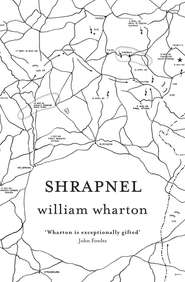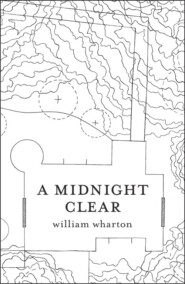По всем вопросам обращайтесь на: info@litportal.ru
(©) 2003-2024.
✖
Tidings
Автор
Год написания книги
2018
Настройки чтения
Размер шрифта
Высота строк
Поля
I come out, gratefully, to an empty room. According to my reset watch, there’s still five minutes till the train arrives. In the bright neon light over the sink, I can see all the mill dirt I’ve hauled with me. I use a dirty handkerchief to brush off the worst. My new L. L. Bean crepe-soled shoes are covered with goop from in front of our garage. I run trembling fingers through my crazy looking shock of white hair. I hate being nervous, so nervous my hands shake. It seems to happen more often lately.
I started graying seriously at thirty-five, had a white streak in front when I was only in my twenties. There’s something about those of us with a premature white streak, gray or white hair which causes other people to distrust us. I think they feel we’re crazy or have had some terrible trauma which has permanently disabled us. Maybe that’s how I became a philosophy major. I look like someone who worries about things. I am.
Now I’m fifty-two it isn’t so bad, white hair is more appropriate but none of it will fall out. They’ll bury me still looking like a slowly fading, washed-out boy. That’s not far off the mark either. I’ve been waiting over fifty years to feel like a man. I might as well get used to it, it’s probably never going to happen.
I stare ten seconds at unsure cerulean blue eyes surrounded by somewhat bluish flesh, as I wash my hands. It’s really weird, as I get older, my eyelids keep drooping so now my eyes look as if they’re peering out from the ends of side-by-side pup tents.
I should have shaved this morning but there wasn’t time; also, I didn’t think of it. My beard, strangely enough, is still dark, at least the stubbles are. Once I let it grow a little to see how it would look. I looked as if I had my head on upside down.
The train is five minutes late so I have time to make a momentous discovery, for me, that is. It’s far from original, this insight, but it’s creative within my personal limits. I discover why croissants are made that way, wrapped as thin layers into a crescent form. It’s so they can be dunked in coffee, easily, with virtually no crumbs dropping in the cup. I luxuriate over my croissant, my lukewarm coffee and my idea, feeling genial and very cosmopolitan. The anxiety of the trip is dropping off like that slush from the Nevers road.
Coffee usually makes me hyper, but this time I’m soothed, perhaps because it’s almost cold, or perhaps something chemical happens when it combines with a dunked croissant; or probably this is only a letdown after the mad, desperate rush. I don’t know which, but I’m mellow, very Santa Claus-Christmasish, wishing I had a bell and sleigh. It would be great fun to really be Santa Claus. Maybe next life.
So, when I hear the train from Paris come into the station, and I go out onto the quai, I’m the international man meeting his loved ones at the start of some story in a book. Probably a book by John O’Hara or J. P. Marquand about unrequited love. Better not to think about that; not now anyway. I’m still not ready.
2
Two Turtle Doves
Out on the quai, I’ve just about given up, I’m beginning to think of phoning Paris. My mind’s spinning wildly through all the bleak alternatives; then I see them, the last ones off the train.
I should have known. It’s not Loretta’s way to fight through a crowd just to be first or tenth or thirtieth, or three hundredth. She’ll sit unruffled till everyone’s struggled, fought, scrambled themselves away with their luggage; then, unhurriedly, graciously, as if it’s her private car, as if there were no such thing as time, she’ll dismount, nice smile for the conductor on the way out. Ben’s the same, I’m not. I’m a pusher-shover. The two of them drive me nuts; I hate to imagine what they think of me.
So there they are, lightly luggaged, drifting dreamily along behind the crush. They find me and I think we’re all glad to see each other. Christmas is actually beginning. I sneak some looks at Lor to see how she’s holding up, but she has her ‘isn’t the world lovely’ smile pasted on her face so I can’t tell anything. Mike has a smile like that, too; but his is amateurish and childlike compared to Lor’s.
First we drive out to a large market, two kilometers from town, called Carrefour, French for intersection. It’s almost like an American supermarket, huge parking lots, grocery carts, Christmas music playing. We’ll stock in the bulk of our perishable groceries here and perhaps buy some gifts for our neighbors.
The big purchase will be the turkey. It needs to be large enough for six with enough left over for turkey soup and a hot turkey sandwich meal.
I’ve already bought all the nonperishables in Paris and carried them down in the car, extra goodies such as Nova Scotia smoked salmon, chocolate bars, several cookies: Russian cigarette, chocolate chip, oatmeal raisin. Also a bottle of Cointreau, some Poire William, Cognac and Champagne. These are the superlatives. There are also eight hundred francs’ worth of the necessities, apples, flour, rice, cheeses, sugar, butter, canned goods, onions, matches.
Lor, Ben and I push our cart through the aisles, agreeing, disagreeing, picking, weighing, gradually filling up. We buy more tangerines, oranges; walnuts for the Christmas cookies. A sack of peanuts in the shell, endive, lettuce, tomatoes; celery, stalk and root, for the turkey stuffing. That turkey isn’t the only one who’s going to be stuffed.
I also buy a ten-liter can of spar varnish and a new paint brush. This costs over three hundred francs right there. My mind glistens just thinking about that varnish.
I sneak in a Cuisinart food processor for Loretta. We also fulfill Ben’s greatest Christmas wish: a Russian-built, clip-loaded 22-caliber rifle with a seven-power telescopic sight. Rifles are a minor mania with this peaceful, shy, almost fifteen-year-old last child of ours. He, through his Guns & Ammo magazine, is our only contact with a whole world to which neither of us relates. Lor is concerned about the appropriateness of a rifle on a festival of peace. But it’s also a festival of love. A good part of love, to me, is respecting the uniqueness of another, especially when his preferences are different from yours. God, I’m a great one to talk about love!
Ben is as much concerned with trajectory, accuracy, optics as anything. A rifle to him is a magnificent tool for projecting an object at high speed over a considerable distance with accuracy. It isn’t far removed from his passion for model airplanes and gliders. He has a horror and fear of actual hunting, or flying in a real plane. Hang glider, or hunter, or soldier he’ll most likely never be.
We also buy log cabin logs, two dolls, baby doll carriers, a spinning top with a tiny train inside which goes around and whistles when the top spins, plus a sack of grain to feed the ducks on the pond. For Madame Le Moine we buy a potpourri of plants all in one pot. For her son, Philippe, thirty-seven years old and unmarried, a set of small glasses, each with a different fruit sealed in eau de vie, also one of those dogs which wags its head when you put it on the back shelf of an automobile.
On the way out of the market we see some Christmas trees. These trees are small, none taller than six feet, but they’re cheap, only eighteen francs. They’re unloading the truck with a new supply. We choose the bushiest, tallest tree. Ben’s in a state of shock as I tie it to the roof of our car.
‘Gosh, Dad, that’s not a Christmas tree, it’s a branch.’
I assure him I’ve found a stand of most beautiful trees in the woods near Mike’s cabin. Philippe told me this part of the forest is owned by Monsieur Boudine and I can probably make a deal with him to cut down one of the trees for us. All year we let him pasture his donkey. Pom Pom, in our field when we aren’t there, so we should come to some arrangement. Paying to have someone cut down a tree for us in plain daylight is a long way from stealing one in the secret of night but a sight better than what we’re hauling on our car.
We drive into central Nevers, it’s almost two o’clock and the traffic is a muddle. By sheer luck we see a woman with two kids coming out of a parking place on a one-way street behind the post office. We’re on the wrong end of the street. I gallantly let the woman out, then wildly start backing up the narrow passage between close-parked cars. I am notoriously one of the world’s worst backer-uppers. I’ve always considered it a special skill like juggling or tightrope walking and I don’t have it. Some people can safely back up at full speed using only the rear-view mirror. I need to twist all the way around and look directly back to have even half a chance.
Loretta’s up on her knees, rubbing the rear-view window clean, trying to give directions in a calm but clear tone of voice so she won’t spook me. Ben is scrunched down in the seat beside me, avoiding flying glass. I’m going fast as I can, twisting my bad back, rushing to get to that place before a car entering the correct direction gets there. We just beat out a Peugeot 505; the driver smiles grimly and waits while I make a messy four-swing park, then he zooms down the street past us. We sit a moment while I recoup my calm.
Shopping in Nevers is always fun. The old streets are decorated, but nothing too gaudy. There are no loudspeakers playing Christmas carols. The main streets are blocked so there are no cars. The stores are old-fashioned, mostly with creaky, shined hardwood floors. The elevators are wire cages which jiggle, then bounce when they stop. They only take people up; you walk down.
We go our separate ways, agreeing to meet by the car at three. That way we can hope to get home before dark. At this latitude, this time of year, with clouded skies, five is almost night. I find a good, practically prebuilt but put-it-together-yourself, rubber-band model of a Sopwith Camel World War I airplane. I buy a waffle iron for the family, and an electronic game of Battleship for Ben. We’ll leave the waffle iron at the mill where there’s always time for leisurely breakfasts. I find an easy-to-operate Polaroid camera for Lor and buy two packs of film. I buy some holders and candles for the Christmas tree.
I’ve arranged with a painter friend in Paris to paint portraits of the girls. He’s good, they’re the right age to be painted and he could use the money; a triple-threat Christmas present.
Ever since the girls reached thirteen, I’ve had no chance at all of buying them a present they like. Buying any clothing is catastrophic, witness the orange raincoat I bought Maggie for her fifteenth birthday, the knee-length boots for Nicole on her fourteenth Christmas. Apparently I’m the same problem for them. I’d hate to be buying anything for me, I can’t think of one thing I want; at least anything someone could buy. Nobody can buy time, or love, or understanding. They’re too perishable, difficult to transport.
We congregate at the car. Even Ben’s bought a few things so we’re almost as packed as I was coming down from Paris. Loretta climbs in the back seat and we pile packages on her; Ben with his long legs can’t fit back there and Lor’s afraid of the suicide seat in a car.
When we turn off the main Nevers road into the back country it’s past four o’clock, darkness is coming on and although the fields and trees around us are still covered with snow, the narrow roads are relatively clear. I switch up to my high beams, not because it’s that dark yet, but to compensate for my lack of horn going around curves. The local driver in this area still thinks he’s the only automobile within fifty kilometers and hogs the crown of the road. Death by deux chevaux is far more common than impalement by wild boar around here.
We happily come down the icy Vauchot hill and pull up in front of our place. The mill is unique in that it’s built into the dam forming the pond; this road on which we’re arriving is about fifteen feet below dam level. The grange-cum-garage and the cellar open onto the road. The portion of the mill we’ve converted for living, where I’ve spent the past three days hustling, trying to get it into living order, opens onto the top of the dam. Our door up there is only ten feet from the pond itself, practically level with it.
We start unloading. Ben helps me untie our mini-Christmas tree. I delay putting our car in the grange so I can be inside the mill when they first see all my refurbishments, drapes, rehung cabinets, general cleanup, holly, pine boughs, decorations.
Loretta and Ben walk around to the damside door with some of the provisions. I dash through the cellar, up those steps through our hingeless trap door, into the main room. I turn on the lights, put a match to my preset fire and turn up the new butane heater before they arrive. I open the damside door from the inside and step back without comment.
Ben moves to his guns which I’ve hung beside the fireplace.
Lor is wonderfully appreciative; makes it all worthwhile, remarks on the drapes, the clean windows, ‘even in the dark they glisten’. She exclaims over the decorations, comments on the general order and cleanliness. I was lucky enough to marry a woman who has good nesting feelings. But I still have the uneasy feeling she’s only going through the motions, play-acting, pretending, trying to make me happy. I hope I can hold onto her somehow. I hate to think of life without her.
The fire took on perfectly with one match and isn’t smoking. Lor even notices I cleared out those damned ashes.
Ben and I haul the rest of our things from the car while Loretta puts them away. I make my mad, sliding run through the snow and slushy mud, maneuvering our car into the garage without hitting any motorcycles or motorcycle gas tanks, carburetors, extra wheels or rusting tools. I manage to match and close the interlocking device securing the big doors, wiggle through the small door and miss the greater part of the mud. On my way through the cellar, I gather an armful of dry tinder to start our fire next morning.
It’s a strong, good feeling having the nucleus of our family together again. Stone walls, heavy wooden beams, even a glowing fire, a shimmering pond and a splashing waterfall, can never replace or compensate for feelings of love and loving. I know my sleep tonight will be different than it’s been these past three nights. When I sleep alone, I sleep deeply, dreamlessly; the night seems to just disappear. Sleeping with Lor, I dream, I wake for brief periods. I know I’m sleeping and I don’t feel alone.
After dinner, we light the red candles in a silver candle holder I found and shined. They look beautiful on top of our new red remnant tablecloth. Lor and I sing Christmas carols; Ben listens. I’ve jammed the small Nevers tree into the center hole to one of the reserve millstones. This stone is flat on the floor just to the left of the door as you come in from the dam. Once there were two stones in that place, one on top of the other; but I moved the upper stone as a base for our fireplace.
It took three automobile jacks, two levels, several inclined planes and half a heart attack moving that stone against the wall, then constructing our fireplace on it. The fireplace is heavy, more or less squared-off stone, rounded, projecting into the room, sort of a Dutch oven, with a throat resembling the entrance to a cave.
The smell of the fire, our mini-tree, the pine boughs, burning candles fills everything. The second night of Christmas is upon us. And I still don’t know what to do. I’ve got to tell Lor, it isn’t fair to just let it go on like this.
Later, when we’re tucked in bed listening to the roar of the waterfall from the pond, the crackling of our fire, the deep breathing of Ben sleeping on a cot in front of the fire, Lor does her usual just-before-going-to-sleep ‘sigh’ and says ‘I guess we’ll hear from the girls tomorrow; they should be in Paris today.’
I think to myself that in less than an hour Ben will be fifteen. It won’t be long before we’ll be having all our Christmases alone, if we’re lucky enough to stay together. Right then, for the first time, I realize I’ve lived with Lor almost twice as long as I’ve lived with anybody else in my life. Since my parents are dead, and I’m an only child, I’ve known her longer than anybody else. She’s the closest thing to a ‘reality’ I know.
The day after Christmas will be our thirtieth anniversary.
Next morning, while we’re having breakfast, Madame Le Moine peers into the damside door and knocks. She’s come all the way around up onto the dam and down our narrow, slippery, stone steps. I’d made arrangements for her to get the number if anyone phoned and tie a dish towel on her door handle. I can see her door easily from our west window and I’ve been checking regularly for it the past few days.
Madame Le Moine recently celebrated her eightieth birthday. Five months ago, she had a stroke which left her partially paralyzed and with failing memory. She’s almost completely recovered now, but definitely shouldn’t be running around delivering phone messages in this mud and snow.
We’re bullheaded about not having a phone. We dislike the invasion of privacy a phone, a TV or a radio allows. We were the first to have a toilet but are now the only ones without a TV, a phone or a radio. We’ve given Madame Le Moine’s phone number exclusively to our kids and a few friends. I know it has to be one of ten people when Madame Le Moine stutters out – ‘Tell-ey-phon.’
I invite her in. Loretta skims along the dam to Madame Le Moine’s house. It almost has to be Nicole just as Nicole knows it’s Lor who will answer. I could go into my aversion to answering phones here, but I won’t. I think it has to do with voices from anywhere out of nowhere.











